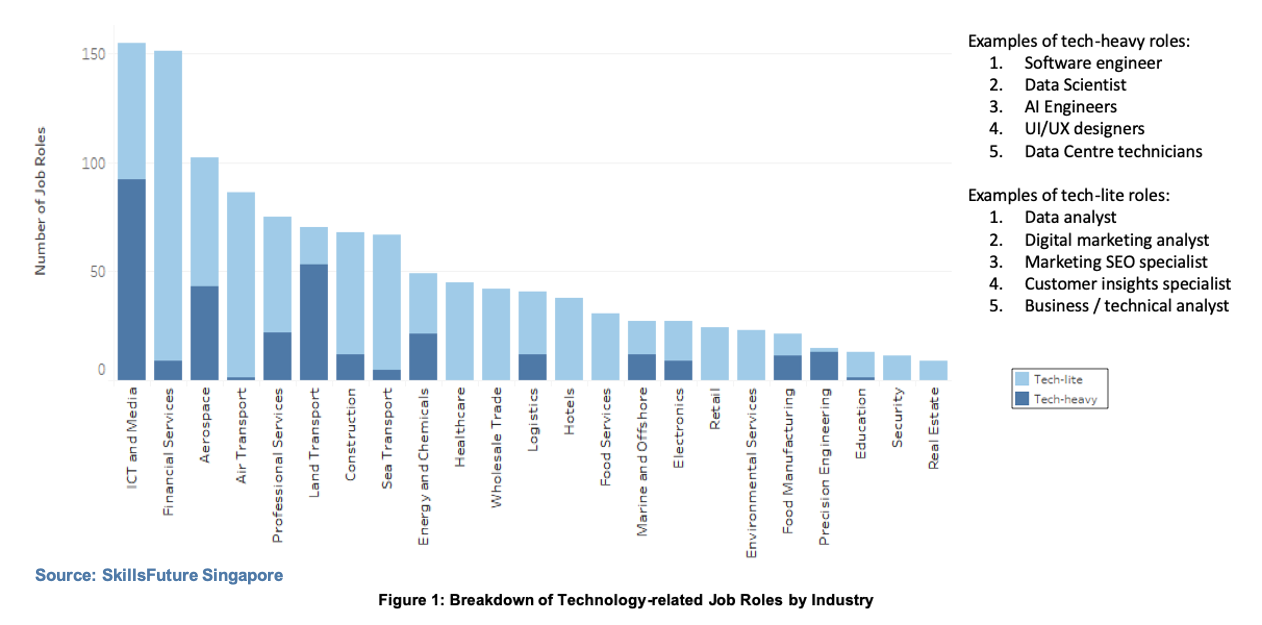The Digital Economy drives jobs and skills in more than 20 sectors today
The Digital Economy drives jobs and skills in more than 20 sectors today
The digital economy is a professional cluster of tech jobs and skills that is defined, organised, enabled, and facilitated by digital technologies and innovation. Growing our digital economy is part of our national efforts under our Research, Innovation and Enterprise 2025 Masterplan as well as Singapore’s smart nation efforts.
The global digital landscape is a rapidly evolving one. Digitalisation across sectors have been accelerated by the COVID-19 pandemic, bringing to the forefront the increased need for digital technologies, platforms, software, hardware and services. Today, tech jobs[1] are required across all the 23 ITM[2] sectors (see Figure 1). Majority of them are tech-lite roles which do not require specialized and advanced IT skill sets to perform the work functions. These include roles such as data analyst, digital marketing analyst, and customer insights specialist.

What are the Tech Skills that Matters?
a. Tech-lite skills are required across 3x more roles than tech-heavy skills. Top three clusters of tech-lite skills (technology application, data analysis / analytics, and market research / trends) are required by more than 750 roles across different sectors like Financial Services, Sea Transport, Professional Services, and Healthcare. These in-demand roles include data analysts, digital marketing analysts, business analysts, and customer insights specialists.
b. Top tech-heavy skills are technology development, which includes the ability to analyse, review, formulate and lead new digitalisation transformation. Other skills clusters such as Internet of Things (IoT) management and big data statistical analysis are key skills for tech-heavy job roles to enhance operational efficiency and effectiveness.

Click here to explore courses for the Digital Economy.
Two important sectors in the Digital Economy are ICT and Financial Services
Information and Communication Technology (ICT)
The Information and Communication Technology (ICT) sector consists of businesses whose products or services enable information processing and communication by electronic means. Today, Singapore ranks among the world’s most digitally connected countries and continues to lead the pack with our Smart Nation ambitions, leveraging growth opportunities in the digital revolution and using technology to benefit all segments of society. The rise of new technology such as artificial intelligence (AI), Internet of Things (IoT), and 5G have paved the way for businesses to improve their operational efficiency, strengthen their business models and portfolio of digital products and services, and enhance customers’ experience. As we continue to enhance local ICT capabilities and build new partnerships, there are immense opportunities for us to build a broad base of tech-heavy and tech-lite jobs and skills in this sector and equip local talent to take on managerial and technology leadership roles in enterprises.
Examples of Tech Jobs in-demand by ICT Employers
1. Business Intelligence Manager
2. Software Engineer
3. Business Analyst/Artificial Intelligence Translator
4. Business Architect
5. Channel Sales Manager
|
Top Required IT Skills in ICT 1. technology scanning/evaluation 2. software configuration 3. business environment analysis 4. problem solving 5. data analysis/analytics 6. infrastructure strategy/management 7. systems integration 8. IT strategy/policy 9. solution architecture 10. network administration |
Top Emerging IT Skills in ICT 1. business needs analysis 2. data governance 3. data design 4. data ethics 5. data engineering 6. digital/cyber forensics 7. data visualisation 8. data management 9. computational modelling 10. computer vision technology |
Click here to explore courses for the ICT sector.
Financial Services
The financial services sector provides financial services to people and corporations, such as banking, insurance, investment, and wealth management. Today, Singapore is a world-class financial hub, with more than 1,300 financial institutions, including banks, insurance companies, and fund managers. With the continued rise of the middle class, growing demand for infrastructure development, and the expansion of Asian enterprises, employment growth is expected to be sustained across key business segments such as banking, wealth and asset management, and insurance, as well as specialist areas such as compliance and risk management, cybersecurity, mobile/e-payments, and the cloud.
The digital transformation that the financial services sector is undergoing require talent that have both domain skills (e.g. investment and financial management) and tech skills (e.g. business needs analysis and consumer intelligence analysis). While the bulk of tech roles in Financial Services are tech-lite in nature, there is increasing hiring demand for tech-heavy roles and skills to help innovate and build the technology required to transform the sector.
Examples of Tech Jobs in-demand by Financial Services Employers
1. Account Operations Analyst
2. Transaction Banking Operations Analyst
3. Data Engineer
4. Digital Transformation Manager
5. Technology, Information and Cybersecurity Risk Analyst
|
Top Required IT Skills in Financial Services 1. Business Environment Analysis 2. Business Needs Analysis 3. Consumer Intelligence Analysis 4. Data Analysis/Analytics 5. Data Governance 6. Financial Analysis 7. Financial Modelling 8. Market Research/Trend 9. Portfolio/Profit Analysis 10. Qualitative Analysis |
Top Emerging IT Skills in Financial Services 1. Application Support/Enhancement 2. Computational Modelling 3. Data Visualisation 4. Programming & Coding 5. Risk Analytics 6. Risk Management 7. Technology Application 8. Technology Scanning/Evaluation 9. Cybersecurity 10. User Experience Design
|
Click here to explore courses for the Financial Services sector.
[1] Tech jobs, as defined by IMDA, can fall into different categories: Tech Users, Tech Implementers, Tech Researchers, Tech Product Innovators, and Tech Leaders and Entrepreneurs
[2] ITMs refer to Industry Transformation Maps that were first developed in 2016 as part of recommendations under the Future Economy Council. The government is working on refreshing the 23 ITMs, incorporating recommendations from the Emerging Stronger Taskforce, closer integration with research & innovation, and greater focus on jobs and skills
Posted on 01/09/21